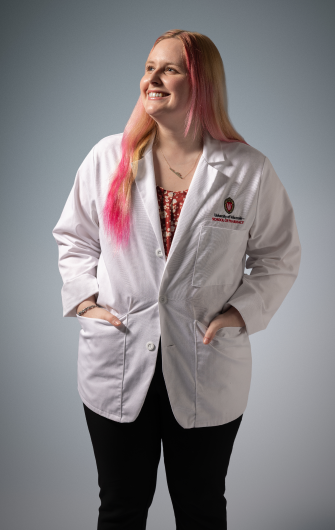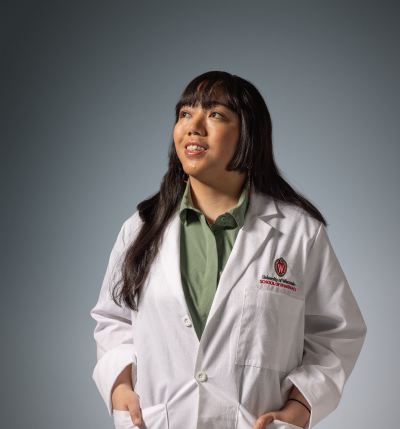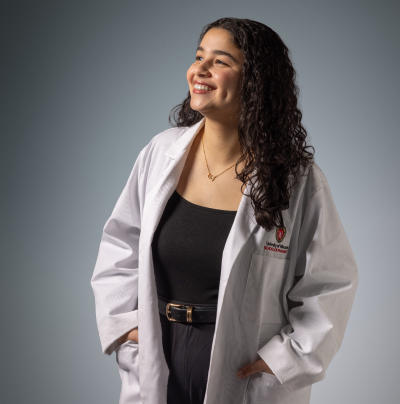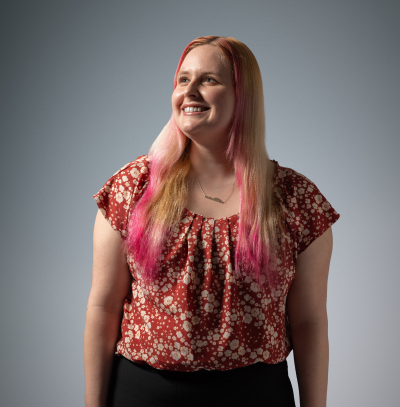What I Actually Did in My Introductory Clinical Rotations (And Why It Matters)
By Alyssa Pankau, PharmD Class of 2027
 When I was in high school, I thought pharmacy was mostly about counting pills behind a counter. What I didn’t know was how much pharmacists are involved in patient care and how diverse the field actually is. At the UW–Madison School of Pharmacy, I’ve had the chance to see this firsthand through our Introductory Pharmacy Practice Experiences (IPPEs). These hands-on learning opportunities have helped shape my understanding of pharmacy, build my clinical skills, and give me a clear sense of what kind of pharmacist I want to become.
When I was in high school, I thought pharmacy was mostly about counting pills behind a counter. What I didn’t know was how much pharmacists are involved in patient care and how diverse the field actually is. At the UW–Madison School of Pharmacy, I’ve had the chance to see this firsthand through our Introductory Pharmacy Practice Experiences (IPPEs). These hands-on learning opportunities have helped shape my understanding of pharmacy, build my clinical skills, and give me a clear sense of what kind of pharmacist I want to become.
At UW–Madison, students complete various IPPE rotations each year throughout the first three years of pharmacy school. Each experience builds on the last, starting more observational in the beginning and becoming more hands-on as you progress. These experiences are a chance to step away from the classroom and apply what you’ve been learning to real patient care settings, guided by practicing pharmacists who serve as preceptors and mentors.
Seeing patient care firsthand in community pharmacy
The first type of IPPE I completed was in a community pharmacy. This is the kind of pharmacy most people are familiar with, the one where you go to pick up prescriptions. But being behind the counter as a student opened my eyes to how much more pharmacists do. I was able to see the entire workflow of the pharmacy, from receiving prescriptions to verifying medications, counseling patients, and working with insurance companies. I also saw the incredible amount of clinical knowledge that pharmacists use every single day.
For my rotation, I had the opportunity to be placed at an independent community pharmacy, which was an amazing experience. It was different from the large chain pharmacies most people are used to. At this location, the pharmacists offer a range of specialized services like compounding, medication synchronization, and personalized medication counseling. I got to experience how pharmacists speak with patients and build long-term relationships with them. That sense of trust and community was something I had never seen before, and it left a strong impression on me.
Making a difference in the hospital setting
The second major IPPE rotation is inpatient pharmacy, which takes place in a hospital setting. In this environment, the pharmacist’s role is very different. I started by observing the central pharmacy, where medication orders are processed and prepared for hospitalized patients. I helped complete product checks, participated in a compounding room inspection, and even helped refill automated dispensing machines, all under pharmacist supervision. It was fascinating to see how critical the pharmacy is to the hospital’s day-to-day operations.
One of my most meaningful experiences was shadowing clinical pharmacists on the hospital floors. These pharmacists are directly involved in patient care. They review lab values, adjust medications based on kidney and liver function, and work closely with doctors and nurses to make sure patients are receiving the best therapy possible.
During my most recent inpatient rotation, I got to practice working up a patient by looking at their labs, medication list, kidney function, and diagnosis and then come up with recommendations, just like a pharmacist would. I was able to sit down with my preceptor afterward and talk through what I did well and what I could improve. I even got to see the provider accept one of my recommendations for a patient’s therapy, which was an exciting moment as a student. Being a part of that process from admission to discharge and knowing I helped make a difference was incredibly rewarding.
Electives offer flexibility to explore
The final type of IPPE is an elective rotation, where you get to choose an area that interests you whether that’s more community or inpatient pharmacy, or something completely different like ambulatory care, drug development, or public health. These electives are an amazing way to explore different parts of the pharmacy profession and see what kind of environment you might want to work in after graduation.
For example, my elective IPPE has allowed me to focus on acute care, so working in an emergency room and the intensive care unit (ICU) in a hospital. This is an area of pharmacy I am interested in and the experience helped me gauge how interested I am in this area.
What makes UW–Madison’s IPPE program so strong is how it grows with you. You’re not just thrown into a clinical setting, you’re prepared every step of the way. Faculty, preceptors, and staff work hard to match students to meaningful experiences, and they genuinely care about helping you succeed. These rotations have not only helped me apply classroom knowledge in real-life settings but also helped me build confidence, communication skills, and clinical judgment that I know will carry into my future as a pharmacist.
Learn more about UW’s exceptional clinical training.

The clinical training experiences that took me from nervous beginner to confident future pharmacist

What IPPEs and APPEs really mean (and the experiences I’ll remember forever)

The path I took to pursue my passion and gain a competitive edge